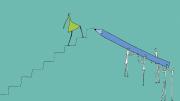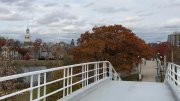The thing about college that brochures can’t mention is that there are the good days and bad days, and you’ve got to figure out what to do about them both. You’ve got to find a place to go when you’re in crisis, and a person to celebrate with when the storm clears, because both crises and celebrations are guaranteed. To build yourself a support network is a survival skill, and for many of us, undergraduate life is the first testing ground.
Brochures can’t explain what it is to be uprooted and chucked into a sea of fellow transplants, everybody grasping. You can’t know until you’re there—at the wheel inside a parking garage with 1,599 other vehicles, each driver profoundly excited, confused, and desperate for a place to park. I call this the Annenberg Effect. It is the dizzying prospect that any given stranger sitting at any given table in that massive dining hall could be your…well, whatever it is you’re here to look for.
There is plenty of fear there, but the belief can also make optimists of the best of us. You emerge from the servery, confronting a parade of social options that mirrors the cafeteria offerings. You’ll sit down with anyone. You’re open to chance. This is, I’d argue, the spirit of freshman year. Everything is possible, anything is probable. It’s a lot of pressure, especially for those of us with poor small-talk skills.
I, for example, used to have a bad habit of commenting on other people’s mealtime choices. A brief inventory of what I’ve noticed: Athletes can be identified based on the number of hardboiled eggs they eat at breakfast. There are three types of cereal consumers—those who go dry, those who add milk, and those who add yogurt. (You may also categorize based on when they consume cereal.) Sriracha can accompany almost anything, and the same goes for ketchup.
That said, eating habits can reveal more than spice tolerance. I know someone who gets by fine with one meal a day. I know someone who eats in one very specific fashion when she’s doing well, and in an entirely different one when she’s not. I know someone who doesn’t eat much, but if you know how, you can prod her, and that helps. If you’re in the right company, the food on your tray may show your hand.
As for me, when the going gets rough, I won’t be found at lunch, dinner, or breakfast. My undergraduate years have been shaped by my struggle with anxiety and depressive behavior. On the worst days, and I’ve had plenty of those, it is impossible even to consider entering the dining hall. To do that, I might have to say hello to someone, or insist things are going well when that’s a blatant lie. It can be paralyzing to ask for help, though it’s deeply needed. It can also be paralyzing to consider that someone might be paying close enough attention to offer it. Where I’ve grown most in the past four years is in my willingness to confront that paralysis, to see and take and thank that outreaching hand.
Last November, University Health Services announced that the centrally located Stillman Infirmary would be closing its doors. Even though UHS director Paul J. Barreira insisted the decision was based on Stillman’s underutilization, undergraduates cried foul. Stillman offers 24-hour urgent care. The idea that someone faced with a critical situation might have to trek to Mount Auburn Hospital at three in the morning stirred heated debate.
Student reactions ultimately prompted open town-hall meetings with Barreira, and the organization of a student working group focused on the issue. (At press time, the discussion continued.) I’m willing to speak for my peers when I say the possibility of losing Stillman shook us up because we all know what the bad days can be like, and where stress and isolation and fear can lead you. I think we want to know that, in that moment, there will be one more nearby place we can go.
To care for others takes both practice and persistence. To care for yourself can take even more. I like that I know other people’s eating habits, weird as that may be, because it’s a body of knowledge I’ve worked for. All the observations I’ve filed away have been made in service of a kind of learning. They are stitches in the networks of support and friendship we have built out of sheer necessity. They are, for me, a way of explaining the intimacy that emerges from trying to like and love and care for people who once were strangers.
I have seven blockmates. We live together in eight interconnected rooms, with a spare ninth that is a mess of futons and pillows and rugs. One night, during reading period last fall, we ignored our deadlines, stayed up late, and refused to sleep. We sat in our pajamas, on the linoleum floor in the tiny hallway linking our bedrooms, backs to one wall and feet up against the other.
I think it started with two people talking, and then another joined. Then four, then five, and in the end we all got stuck. We piled up against each other to confess and rant and explain, and I, emerging from a haze of stress and frustration, felt overtaken by gratitude for the spontaneous moment of solidarity. I am proud of what we’ve given each other, what we’ve learned, and what we’ve built.
I am now a second-semester senior, and graduation talk bores me. More accurately, it’s the questions that bore me: what I’ll do after, how I’ll feel about it. The answers wouldn’t be boring, but I don’t have them. What I do have is the confidence that practice provides. Everything is possible, anything is probable. We’ve been here before.









